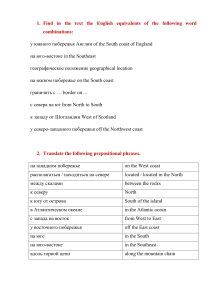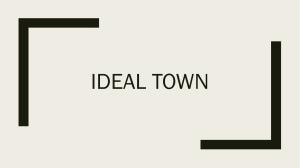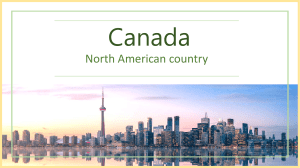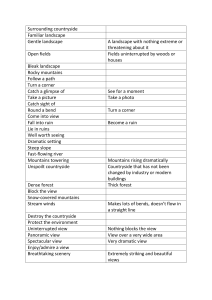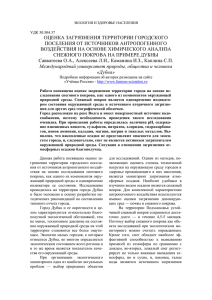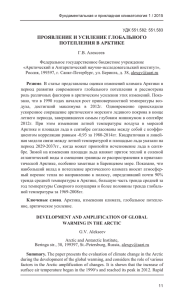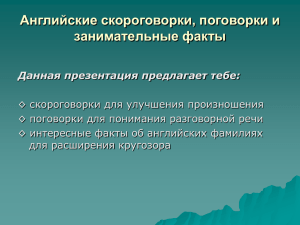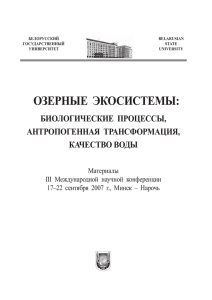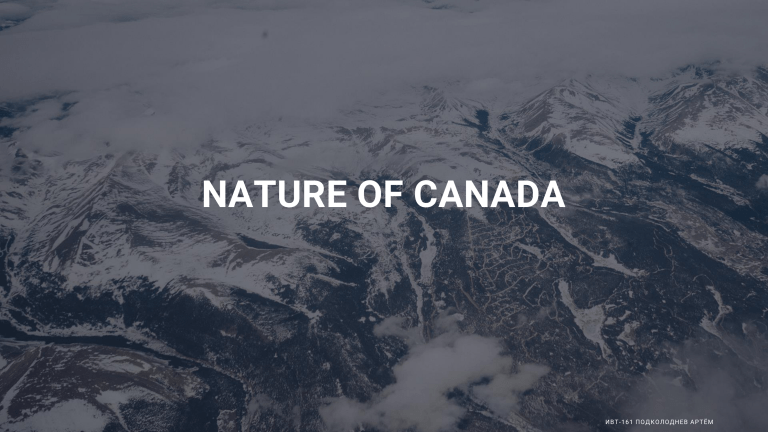
NATURE OF CANADA ИВ Т -1 6 1 ПО Д К ОЛОДНЕВ А Р Т ЁМ Canada is situated in the northern part of the continent of North America. It does not include Alaska. Geographic location of canada Canada has an area of nearly ten million square kilometres. It is the second largest country in area after Russia. Its land boundaries are along the United States of America in the South and along Alaska (USA) in the North-West. Its western coast is washed by the Pacific Ocean and its eastern coast is washed by the Atlantic Ocean. In the North it is washed by the Arctic Ocean. And through the Arctic Ocean Canada stretches to the North Pole. This makes Canada the northernmost country in the world. The country is very big and occupies the territory from the Great Lakes in the South to the Arctic Circle in the North. So, it has many different types of land: arctic tundra, mountains, forests, central plains and vast prairies, high plains, fjords, lakes and rivers, islands and even a desert. Mountains The Rocky Mountains and the Coast Mountains run along the Pacific coast. The Western Cordillera is famous for the country’s highest mountain, Mount Logan, 5,951 metres high. It is situated on the territory of Yukon. In Labrador and parallel to the eastern coast of Canada there are also mountains. Labrador is a peninsula on the eastern coast of Canada. Some mountains are also on the island of Baffin Land. Almost half of the territory of Canada is occupied by the Canadian Shield. It is a huge area which has a shape of a horse-shoe. It stretches around the Hudson Bay from Labrador coast to the St. Lawrence lowlands. The Canadian shield is: the largest natural region in Canada; the world’s largest freshwater island; the most sparsely populated territory in Canada. Geographers gave this region its name because they thought its shape was like a shield. Lakes & Rivers Apart from the oceans on its sides, Canada is a country of lakes. It has seven of the world’s largest lakes (some shared with the US). The province of Ontario alone has 400,000 lakes, big and small, so many that we can hardly count them. The Great Lakes are situated along the boundary between Canada and the USA. They include 5 lakes: the Huron the Ontario the Michigan (this lake is on the territory of the USA) the Erie the Superior For you to remember their names better, keep in mind the combination of letters — H, O, M, E and S (HOMES) — where H stands for the Huron, O stands for the Ontario etc. There are three larger lakes such as: Great Bear Lake Great Slave Lake Lake Winnipeg In addition to the lakes Canada has three of 20 world’s largest rivers. Niagara Falls are one of the most wonderful sights in the world Winter Forest of Canada There are many trees in this country — forests cover around 25 percent of its land. Plant life is different and depends much on climate and land. Most common trees are sugar maple, beech, balsam poplar, fir, yellow pine, hemlock and cedar. The maple tree has become the most prominent Canadian symbol. Its leaf can be found on the Flag of Canada, its coat of arms, coins and many other things. Maple tree Animals The animals in the country have very much in common with those of Northern Europe and Asia. There is the beaver, the sable, the wolverine, the brown bear, the elk, the polar bear, the buffalo, the lemming and the grizzly bear. The beaver became the official emblem of Canada in 1975. Thank you for your attention
